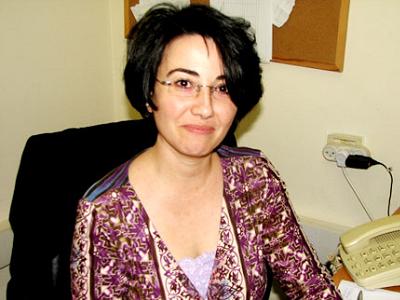Nazareth, Israel (Xinhua): “Every woman can be a woman of frustration. I’m not optimistic. I’m not pessimistic. I’m just struggling,” said Haneen Zoabi, a Palestinian female legislator in the Israeli parliament, Knesset.
Zoabi has made a history in Israel as the first woman to be elected in the Knesset on an Arab Party’s list. At her 41, she has been representing the Arab National Democratic Party in the parliament since 2009.
Sitting in her office in Nazareth, viewed by the Palestinian Arabs in Israel as their effective capital, Zoabi argues in an interview with Xinhua that her real task is to advance the cause of ending Israel’s occupation in the West Bank and Gaza Strip, a cause for both Palestinian men and women.
In her opinion, it is up to the Palestinians to decide the future of those two areas after the complete ending of the Israeli occupation.
“My struggle as a Palestinian is to end the occupation, to dismantle the settlements. I don’t care if I get at the end two states or one state. I care about equality,” she said.
Like many of her electorate, Zoabi identifies herself as a Palestinian, as well as a citizen of Israel.
“I am an Israeli citizen and you must ask me about my struggle for democracy inside Israel. We are Palestinians; we are part of the Palestinian people,” she said.
Concerning the Arab population inside Israel, Zoabi believes that Israel should give their own Arab citizens total equality and full rights. She criticizes some Israelis’ discourse of denying Arab Israeli citizens their narrative, their history and their identity as Palestinians.
“The vision of establishing a Jewish state on Palestinian land changed us from a majority to a minority. We are a minority but we didn’t immigrate to Israel. It was Israel who immigrated to us. We stayed in our land. It is our homeland,” she told Xinhua.
During the interview, Zoabi complained that the Israeli political leadership does not send a clear message to the public in order to contain the incitement and instigation against the Arabs. Rather, she said, it feeds public opinion by approving biased laws against Arabs.
“In Israel there are 30 laws which legally discriminate against the Palestinians. For example, I cannot marry a Palestinian from Ramallah or from Gaza, or from Lebanon or from Syria, and continue to live in Nazareth and have a family in Nazareth, because Israel wants to preserve a Jewish majority,” she said.
The worst law according to the Zoabi’s perception is the law of recognizing Israel as a Jewish nation’s state. For Zoabi, if Israel is recognized as a Jewish nation’s state, it means that the Arabs have to recognize that the Jews are an indigenous population, which also means that the West Bank is not occupied territory.
The Israeli cabinet approved last October a controversial bill proposal that requires non-Jews applying for Israeli citizenship vow loyalty to “the State of Israel as a Jewish and democratic state,” a move firmly condemned by the Arab world.
According to official statistics, one in five Israelis is Arab.
“You cannot demand from me loyalty to a Jewish state because once you say a Jewish state, you say privileges to the Jews at the expense of the Palestinians. There is no real equality between the Jewish citizens and the Palestinian citizens. I want a liberal state. I want a fully democratic state. I want a state for all its citizens,” she said.
Born in Nazareth, Zoabi was the first Arab citizen of Israel to graduate from a media studies course in Hebrew University of Jerusalem, and established the first media classes in Arab schools.
She was active in Arab gender issues in Nazareth before being elected to be the first Arab female legislator from her party.
“I suffer from national discrimination and also from social discrimination. I also want full equality with Palestinian men, so I must struggle for equality within my society. I have a double struggle as a Palestinian and also as a woman. It is difficult,” she said in the interview.
Then comes the question of a moment of frustration for her, a question making Zoabi think for a while.
“Even if I don’t see the end of the struggle, I must ask myself if my direction is the right direction. I don’t care about the end, I care about the direction. I am in the right way,” said Zoabi.























